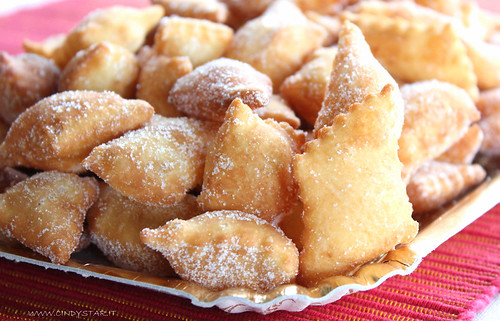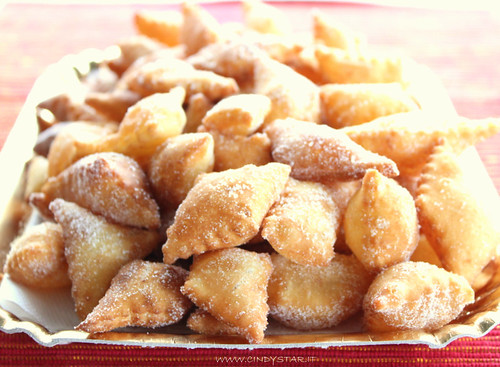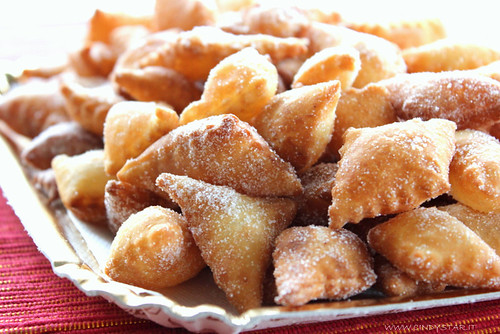Chin Chin - Nigeria
la versione in italiano qui

So here we are, finally landed to Nigeria, last stop of Joan's Final Culinary Tour.
Travelling on the web I found two interesting sites relating to Nigeria: the first one, where I actually got the recipe, is Sunday Blessing Osuchukwu's blog, and is dedicated to promote and mediate Igbo, Nigerian and African traditions and poems to Italians and vice versa. Osuchukwu is also involved in a Voluntary Association founded by immigrants from different countries around the world who live and work in Italy, with the sole objective of social solidarity, human, civil and cultural (they also have their page on FB). The second, however, is Paolo Andreocci's blog, an Italian world traveler, writer, gourmand and gardener as he names himself, you can read his biography here (his page on FB). I am going to copy only a few passages about his article on Nigerian cuisine (Google translater will help you), but it would be useful to read it all to understand the spirit, the difficulties but also the friendliness of this people.
"Nigerian cuisine is very surprising, for the use of unknown ingredients and how they are cooked. The first impression is that of confusion, because there are no precise rules of the meal as we attend: starter, main course, side dishes and desserts. But most of all because it makes no difference between fish, meat or vegetables dishes. In the most important Nigerian dishes , all these elements arealways together, combined with broths, oily sauces , spices and herbs. It is not a refined cuisine. But it has a strong and unique character, based on the exploitation of local products, in a terribly hot and humid climate. In short, some gastronomic choices of Nigerians are not dictated by taste, but by necessity. If we have the culture of olives and vines, the gastronomic culture of Nigeria and the entire coast of West Africa (from Senegal to Angola) is about the culture of palm oil, coconut milk and chili.
As for the fish, it is difficult to accept that in a country facing over the sea you won't ever eat fresh fish, but rather imported dried cod, dried fish, smoked fish, dried or smoked shrimps and shellfish, whole or ground ... It 's amazing. "Amazing - Izunna confirms - but logical! Our climate is very hot and very humid. I know that your fis stinks after three days, but for us, the fish immediately starts to deteriorate, just pulled out of water. Only those who live by the sea or on the Niger Delta can fish and immediately eat it. It 's the cheapest thing they have available. But they really have not time to bring it to market ...... Ask around, to the people of the forest, do the following question: What is happiness? You'll see, they will answer you, happiness is electricity and a refrigerator".
A few words about meat: in southern Nigeria they usually eat beef, including the so-called "fifth quarter" (what remains after the best parts are sold, the 2 forequarters and the 2 hindquarters). But they eat chicken and pork too. The most delicious meat, however, is considered the wild one: the bushmeat. That is to say: wild pigs, antelopes, African buffaloes, monkeys ... But even big wild mice and in some places dogs. I visited several times the markets in Lagos, Ibadan, Port Harcourt ... One of the most impressive things is the processions of skinned monkeys hung on a hook, like lambs. But with one difference: they look like ... babies! "But they are monkeys! - Izunna says. - And in the villages, the monkey is very popular. It's considered low-cost proteins, essential for the human diet. Could you expect that the village people would go to the butcher, with their wallet full of naire, and buy a fillet steak? "
As for the fish, it is difficult to accept that in a country facing over the sea you won't ever eat fresh fish, but rather imported dried cod, dried fish, smoked fish, dried or smoked shrimps and shellfish, whole or ground ... It 's amazing. "Amazing - Izunna confirms - but logical! Our climate is very hot and very humid. I know that your fis stinks after three days, but for us, the fish immediately starts to deteriorate, just pulled out of water. Only those who live by the sea or on the Niger Delta can fish and immediately eat it. It 's the cheapest thing they have available. But they really have not time to bring it to market ...... Ask around, to the people of the forest, do the following question: What is happiness? You'll see, they will answer you, happiness is electricity and a refrigerator".
A few words about meat: in southern Nigeria they usually eat beef, including the so-called "fifth quarter" (what remains after the best parts are sold, the 2 forequarters and the 2 hindquarters). But they eat chicken and pork too. The most delicious meat, however, is considered the wild one: the bushmeat. That is to say: wild pigs, antelopes, African buffaloes, monkeys ... But even big wild mice and in some places dogs. I visited several times the markets in Lagos, Ibadan, Port Harcourt ... One of the most impressive things is the processions of skinned monkeys hung on a hook, like lambs. But with one difference: they look like ... babies! "But they are monkeys! - Izunna says. - And in the villages, the monkey is very popular. It's considered low-cost proteins, essential for the human diet. Could you expect that the village people would go to the butcher, with their wallet full of naire, and buy a fillet steak? "
My friend Izunna is right. Certain dietary habits must be placed in its economic, social and cultural contest. And at this point in the conversation I reminded that time ...
I was with Vittorio Jucker, a wanderer, the most experienced Africa's traveller that I know (and not only Africa). We were driving from Lagos to Abeokuta, going through the forest. It got dark and we stopped to rest before continuing the trip. There was a wonderful starry sky and you could hear monkeys screaming from the depths of the wood, birds crying, in a few words: the voices of the bush. Surprisingly a kid came out of the dark walking towards us, helding a large field mouse by the tail. "I can give it to you for a few kobo," he said. "It 's very good." We gave one naira to the boy, indignantly refused the mouse and immediately turned back to our car. "But the boy was right," Izunna said "rats of the forest are delicious!" Asa was nodding with his head. Then I asked, with a shudder of disgust: "Excuse me my dear, but what did you put in Egusi soup, what did you make me eat?". "Don't panic - she said - I put only beef and a few bites of antelope ... Ah, yes, of course there was the wild pig. Nothing else. Anyway: was it good? ". "Very good!" I replied. But even now, years later, I wonder if Asa fooled me that day. And might she fed me with monkey meat ... am I to be considered a cannibal?"
I was with Vittorio Jucker, a wanderer, the most experienced Africa's traveller that I know (and not only Africa). We were driving from Lagos to Abeokuta, going through the forest. It got dark and we stopped to rest before continuing the trip. There was a wonderful starry sky and you could hear monkeys screaming from the depths of the wood, birds crying, in a few words: the voices of the bush. Surprisingly a kid came out of the dark walking towards us, helding a large field mouse by the tail. "I can give it to you for a few kobo," he said. "It 's very good." We gave one naira to the boy, indignantly refused the mouse and immediately turned back to our car. "But the boy was right," Izunna said "rats of the forest are delicious!" Asa was nodding with his head. Then I asked, with a shudder of disgust: "Excuse me my dear, but what did you put in Egusi soup, what did you make me eat?". "Don't panic - she said - I put only beef and a few bites of antelope ... Ah, yes, of course there was the wild pig. Nothing else. Anyway: was it good? ". "Very good!" I replied. But even now, years later, I wonder if Asa fooled me that day. And might she fed me with monkey meat ... am I to be considered a cannibal?"
For this trip Joan has cooked Chicken Jollof, a stewed chicken and rice dish, and I would like to dedicate her this story about the farmyard Nigerian chicken written by Paolo:
"I think the farmyard Nigerian chicken is the tastiest I know. But to explain why we must make a brief digression, starting apparently from far away.
African termite mounds are very high, reaching two, three meters. They are very complicated buildings, with rooms, corridors and places in which the various castes can attend their social function. They are made of earth mixed with the sticky saliva of termites and can last a hundred years. Termites has a pale body, not big, soft, and maybe even tasty. In fact, chimpanzees are greedy, they put a stick in the anthill, take it out full of swarming termites and suck the unfortunate ones with real satisfaction. They are a great contribution of protein and fat to their diet.
African termite mounds are very high, reaching two, three meters. They are very complicated buildings, with rooms, corridors and places in which the various castes can attend their social function. They are made of earth mixed with the sticky saliva of termites and can last a hundred years. Termites has a pale body, not big, soft, and maybe even tasty. In fact, chimpanzees are greedy, they put a stick in the anthill, take it out full of swarming termites and suck the unfortunate ones with real satisfaction. They are a great contribution of protein and fat to their diet.
Well, I was supposed to talk about the African chicken. In Nigeria and throughout West Africa, you can often see somebody strolling on the countryside with a chicken under his arm. Where is he going? There, just when he meets the red pinnacle of a termite mound against he sets the chicken free to run to it. An earthquake. The building opens, crumbles, collapses and you can see corridors, secret rooms, large halls ... the worker termites are terrified and don't know what to do and escape from all sides. The soldiers immediately rush in compact ranks to defend their city, they attack the intruder, bite him with their powerful jaws, spit their repellent liquid, but the chicken, that looks like a giant to the poor termites, has calloused legs, hard as leather, and shows no discomfort. He flings himself against workers and soldiers and makes a big feast. He devours thousands and thousands of them, until the owner of the chicken says, "Enough is enough, you have eaten enough today." For this particular type of food, the African chicken is so tasty. Unfortunately, you can rarely find them in the cities and in the villages they are sold very expensive nowadays ".
Chin Chin
I chose this recipe these because I was inspired by its name, Chin Chin, in Italian it sounds like Cin Cin! (cheers!), and it seems to me as an hymn to toast to this final tour. And also because while reading the recipe I imagined a sort of small fritters, and indeed they were, perfect for Carnival days we are living! The original recipe called for a huge amount of ingredients, I reduced to one third and adapted a little bit, because I am not so concerned with cups measures. The final sugar brush up is my addition too, anyway it's a sweet snack, and we usually serve our fritters rolled into sugar.
Serving a large tray:
350/400 g flour
130 g soft butter
1 egg
3 tablespoons sugar
50/60 g warm water
50/60 g warm milk
half a teaspoon of dried yeast
peanut oil

350/400 g flour
130 g soft butter
1 egg
3 tablespoons sugar
50/60 g warm water
50/60 g warm milk
half a teaspoon of dried yeast
peanut oil

- Mix all ingredients together, must have a soft and elastic dough.
- Roll out the pastry half an inch high and cut into small suqres or rhombs (a few centimeters per side).
- Deep fry in hot oil, drain and let dry on absorbent paper. Then roll into sugar.
- Roll out the pastry half an inch high and cut into small suqres or rhombs (a few centimeters per side).
- Deep fry in hot oil, drain and let dry on absorbent paper. Then roll into sugar.
Thank you so much, Joan, for making me still dream of exotic and distant places than ever, I might not have the time or opportunity to visit. It was great fun, tiring but so interesting and I am glad I was be able to follow every stop, without your weekly drive and your happy enthusiasm I might have lost along the way. If you ever want to repack your bags and leave again, even for a mini tour, you can count on me, no doubt, my backpack is always ready!
A big thank you to all my travelling fellow, it has been a pleasure to spend these weeks together, and share personal impressions, often so different but always interesting, about the different cultures.
















5 commenti:
Grazie, grazie. Thank you for your company, for your wonderful interpretations of international recipes and for this very interesting post. Yes, electricity and a refrigerator would be on top of my list if I didn't have them.
These chin-chin remind me of zeppole.
Hmmm... that sounds so delicious! Impossible to have only one!
Grazie mile di essere passata da me e per le citazioni nei miei confronti, sono davvero grato. Devo dire che il tuo blog è bellissimo e questo post è eccezionale! La mia bocca è piena di saliva....mi riporta in Nigeria:)
Complimenti per i servizi formidabili di alta cultura che stai rendendo al mondo intero!!!:-)
Tanti saluti!!!
Blessing Sunday Osuchukwu
Your chin chin look really great! And so much like Italian carnevale sweets :)
There are obviously some dishes that are liked all over the world.
And thanks for the great stories; once again I'm glad I'm a vegetarian. I wouldn't like to eat monkeys that look like skinned bambini.
Joan, I am so tired after this tour but so happy to be part of it again and so many new things learned! Electriicity is truly a real help, for everything, we are so lucky and hardly realize!
Thank you again for your warm hospitality!
Renata, the were like cherries indeed!
Osu, ho scoperto quasi un nuovo mondo, e spero proprio che i miei links possano portarlo a conoscenza ad altri molti ancora! un carissimo saluto anche da me!
Torwen, I can understand you, me too would be very impressed seeing those monkeys, but we also have to try to understand other cultures and their habits, often followed by necessity.
Posta un commento
grazie della visita e gentilmente firma sempre i tuoi commenti!
thanks for passing by and please sign up your comments!